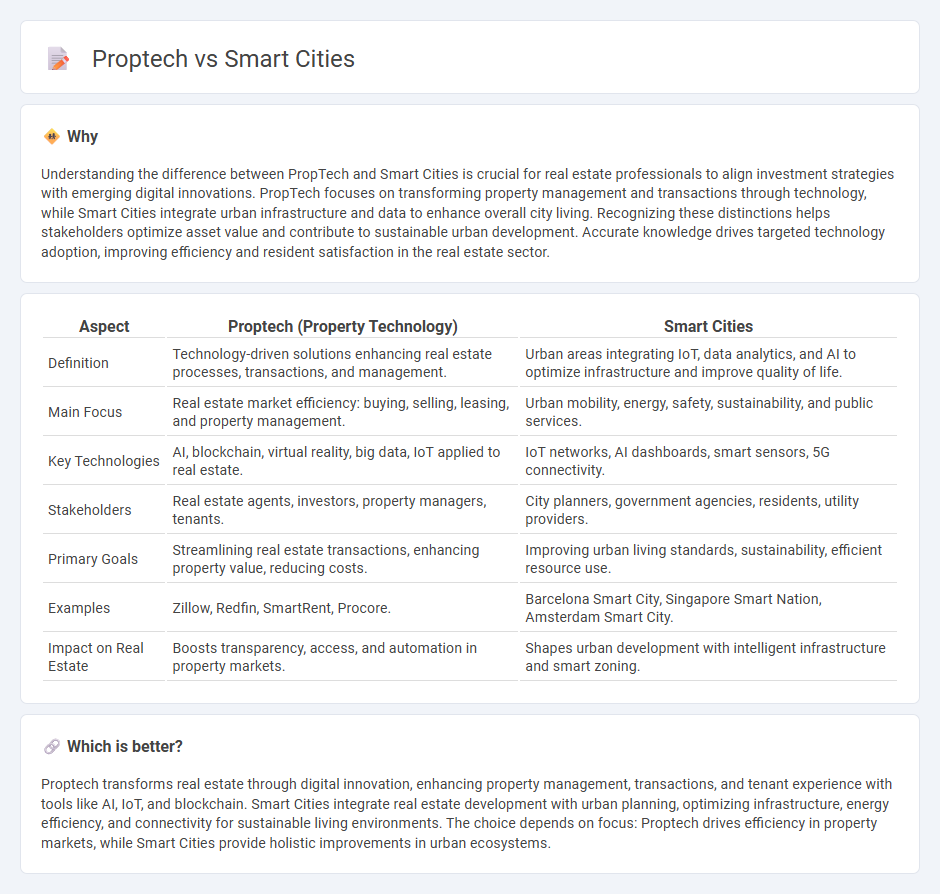
Proptech innovation transforms real estate by integrating digital technologies like AI, IoT, and blockchain to enhance property management, investment, and transactions. Smart cities leverage data analytics, IoT infrastructure, and sustainable design to create efficient urban environments that improve living standards and optimize resource use. Explore how these converging trends revolutionize real estate and urban development.
Why it is important
Understanding the difference between PropTech and Smart Cities is crucial for real estate professionals to align investment strategies with emerging digital innovations. PropTech focuses on transforming property management and transactions through technology, while Smart Cities integrate urban infrastructure and data to enhance overall city living. Recognizing these distinctions helps stakeholders optimize asset value and contribute to sustainable urban development. Accurate knowledge drives targeted technology adoption, improving efficiency and resident satisfaction in the real estate sector.
Comparison Table
| Aspect | Proptech (Property Technology) | Smart Cities |
|---|---|---|
| Definition | Technology-driven solutions enhancing real estate processes, transactions, and management. | Urban areas integrating IoT, data analytics, and AI to optimize infrastructure and improve quality of life. |
| Main Focus | Real estate market efficiency: buying, selling, leasing, and property management. | Urban mobility, energy, safety, sustainability, and public services. |
| Key Technologies | AI, blockchain, virtual reality, big data, IoT applied to real estate. | IoT networks, AI dashboards, smart sensors, 5G connectivity. |
| Stakeholders | Real estate agents, investors, property managers, tenants. | City planners, government agencies, residents, utility providers. |
| Primary Goals | Streamlining real estate transactions, enhancing property value, reducing costs. | Improving urban living standards, sustainability, efficient resource use. |
| Examples | Zillow, Redfin, SmartRent, Procore. | Barcelona Smart City, Singapore Smart Nation, Amsterdam Smart City. |
| Impact on Real Estate | Boosts transparency, access, and automation in property markets. | Shapes urban development with intelligent infrastructure and smart zoning. |
Which is better?
Proptech transforms real estate through digital innovation, enhancing property management, transactions, and tenant experience with tools like AI, IoT, and blockchain. Smart Cities integrate real estate development with urban planning, optimizing infrastructure, energy efficiency, and connectivity for sustainable living environments. The choice depends on focus: Proptech drives efficiency in property markets, while Smart Cities provide holistic improvements in urban ecosystems.
Connection
Proptech innovations drive the integration of smart technologies in urban real estate, enabling data-driven property management and enhanced tenant experiences. Smart cities leverage IoT, AI, and big data to optimize infrastructure, energy efficiency, and traffic flow, directly influencing real estate development and valuation. The symbiotic relationship accelerates sustainable urban growth, real-time analytics, and responsive living environments in connected metropolitan areas.
Key Terms
Internet of Things (IoT)
Smart Cities integrate IoT technologies to enhance urban infrastructure, enabling real-time data collection for efficient traffic management, energy consumption, and public safety. Proptech leverages IoT to optimize building operations, improve tenant experiences, and facilitate predictive maintenance in residential and commercial properties. Explore the transformative impact of IoT on urban living and real estate innovation to understand future technological advancements.
Data Analytics
Data analytics plays a pivotal role in both smart cities and proptech by transforming vast amounts of data into actionable insights for optimizing urban infrastructure and real estate operations. In smart cities, data from sensors, IoT devices, and public services enables efficient resource management, traffic control, and energy consumption reduction. Explore how advanced data analytics solutions are reshaping urban living and property technology for enhanced sustainability and profitability.
Blockchain
Blockchain technology revolutionizes both Smart Cities and Proptech by enhancing data security, transparency, and operational efficiency through decentralized ledgers. In Smart Cities, blockchain enables secure management of public services, identity verification, and efficient energy distribution, while in Proptech, it streamlines property transactions, automates smart contracts, and reduces fraud risks. Discover how blockchain integrates with urban innovation and real estate technology for transformative solutions.
Source and External Links
What is a Smart City? | IBM - A smart city leverages technology and data collection, including ICT and IoT, to enhance quality of life, sustainability, and operational efficiency in urban areas by improving services like transportation, energy, and infrastructure management.
What is a Smart City? | Definition from TechTarget - Smart cities use IoT devices and information technology to collect real-time data, analyze it, communicate insights, and take actions that optimize city operations aiming to improve citizen welfare, sustainability, and reduce environmental impacts like emissions.
Smart city - Wikipedia - A smart city integrates technology, governance, and human capital to promote sustainability, efficiency, social inclusion, and urban optimization by implementing IoT connectivity, data-driven governance, sustainable infrastructure, smart mobility, and citizen engagement.
 dowidth.com
dowidth.com